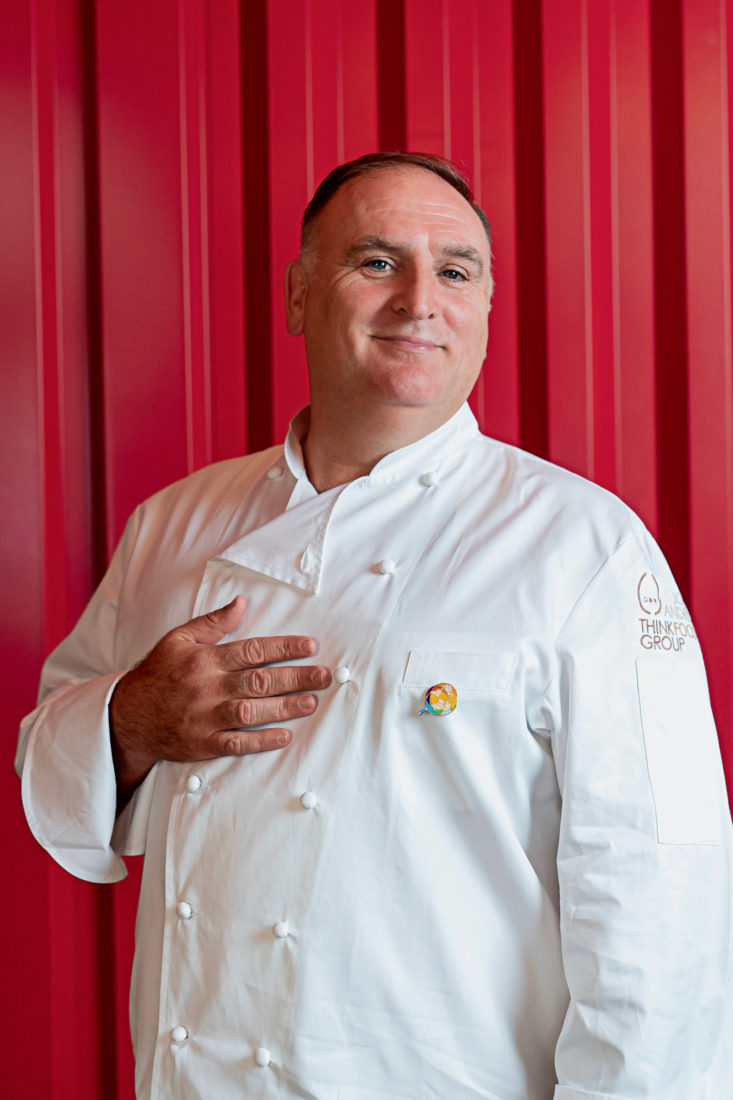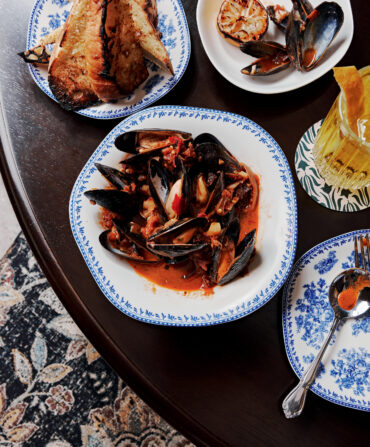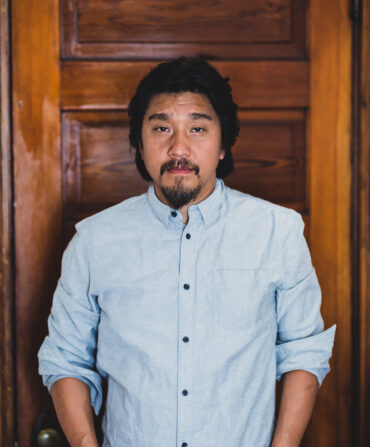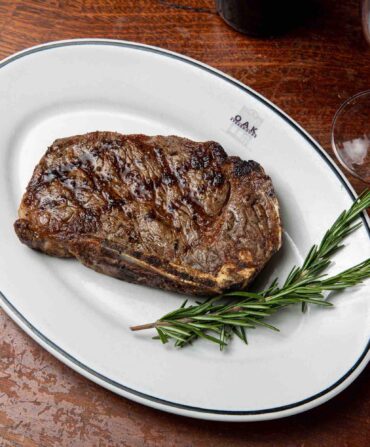José Andrés turns everything on its head. The celebrated chef, a native of Spain, brought his avant-garde take on that country’s cuisine to America, inspiring a culinary empire that now stretches from Washington, D.C., to California. Even the website for his company, ThinkFoodGroup, scrolls from bottom to top instead of the usual direction.
The forty-nine-year-old approaches philanthropy the same way: He responded to the earthquake that crippled Haiti in 2010 by joining the recovery effort in person over and over again instead of simply sending cash. That was just a warm-up to 2017, when Hurricane Maria devastated Puerto Rico. Andrés spent months on the island with his World Central Kitchen nonprofit, coordinating hundreds of thousands of hot meals for people who had lost everything—loved ones, homes, farms, businesses, and most of the electrical grid.
The action earned Andrés accolades, including the James Beard Foundation’s Humanitarian of the Year award, and is now the subject of a book he coauthored with Richard Wolffe, We Fed an Island: The True Story of Rebuilding Puerto Rico, One Meal at a Time (a portion of its proceeds will benefit World Central Kitchen). Andrés has become such a fiery advocate for taking care of people in need that his name is even being suggested for public office. When we reached the chef at his home outside Washington, D.C., he was puttering around the kitchen, cooking red snapper with potatoes for supper.
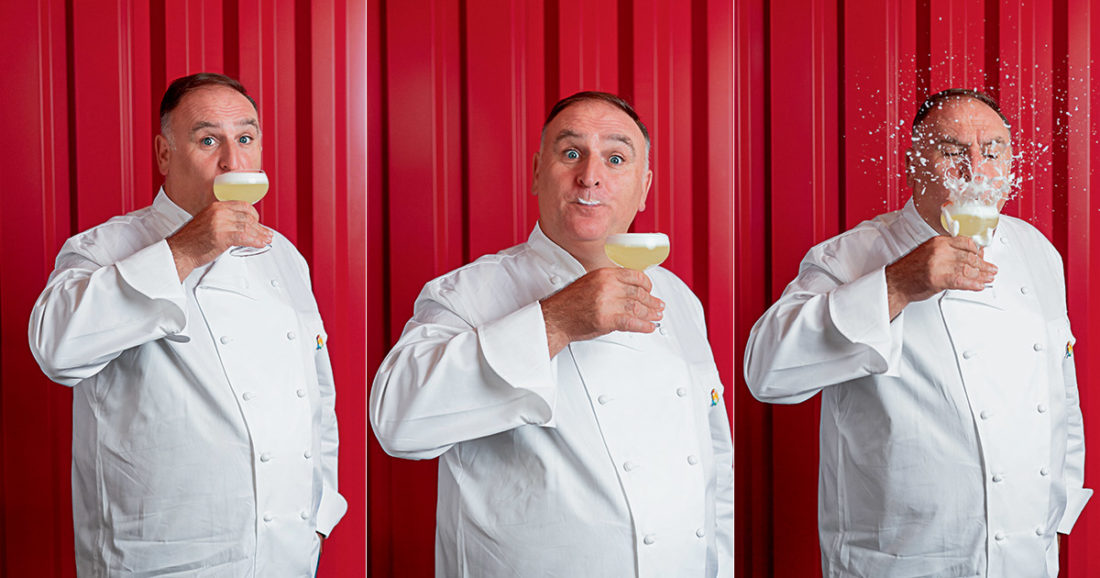
Photo: Scott Suchman
Andrés at China Chilcano, one of his restaurants in Washington, D.C.
Long before the storm in Puerto Rico, you threw yourself into causes and food issues. Did your family have a history of service?
My mom and my father were nurses. I spent a lot of time in hospitals. My mom and dad didn’t have the same hours, so the drop-off for me was at the hospital. To me, nurses go beyond their duty—they always went the extra mile, even if the extra mile was singing a song or giving someone a hat to make them feel better. Sometimes a very little thing, like a smile, can have an effect on people.
Seeing the level of damage in Puerto Rico, the sheer number of people to be fed, many of us would have been tempted to give up. Why didn’t you?
I don’t know. We couldn’t give up. We did it before [in Haiti]. I’ve been in other hurricanes before, I’ve been in earthquakes before. In [Hurricane] Katrina, I still regret I didn’t get in a plane and go there. I heard about [people taking shelter in] the Superdome and I thought, How stupid we were. A sports arena, to me, is a very big restaurant. I remember thinking, If I was there, I would gather a few friends, we would open the kitchens, and we would serve people breakfast, lunch, and dinner. Those things went through my brain. Many chefs in New York used their kitchens after September 11. It was disorganized, but they were feeding first responders and the people who needed food. It was beautiful to see that. It’s not like we do it to get attention. You share with people, and other people join you. In the end, everybody provides what
they can.
You became the face of the recovery in Puerto Rico. Do you worry that people think everything on the island is okay now?
We are still doing five thousand, ten thousand meals a day. We still have free kitchens. In more remote areas, they need our help. We are doing things on the farming side, helping small farmers go back into business. We are getting ready for the next one. Hopefully, it won’t happen, but if it does, we’ll do a better job. We were never supposed to be there—we were not official. Everybody now takes us seriously, but we don’t do it for anybody to take us seriously. We feel there is a need.
Your website lists your titles as “culinary innovator, author, educator, television personality, humanitarian and chef/owner.” If you could use only one, which one would you pick?
I’m a cook. When you are a cook, you can be all those things. I can cook for a TV show. I can cook for my family. I can cook for a book. I can be a teacher. I can be a voice. Or I can just be a cook, to provide food aid to people in a moment. You see? If you’re a cook, you can be all those things.
You have restaurants across the country and beyond, but you got your start in Washington, D.C. After all these years in America, what part of you identifies with the South?
I am a Washingtonian, I am a Marylander, I am a Virginian. I remember when I was in the Spanish navy, [my first experience of the United States] was in Pensacola, Florida. There was a very important celebration going on—the Fiesta of Five Flags. And one of the five flags is the Spanish Castilian flag. I said, I’m sure I belong here—I’m a proud Spaniard and a proud American. I have this book written by Mary Randolph, The Virginia Housewife, and it has Spanish recipes, including gazpacho. That’s because her sister was married to a U.S. counsel to Cádiz.
José Andrés, United States senator. Will that happen?
[Laughs.] You can never say no. But we have good senators in Maryland. Some of them have contacted me—“Are you serious? Are we going to have to compete with you?” When I became American, they told us it would be expected of us to become part of the political system. And you become part not only on Election Day, but day to day. I have plenty of things to do. But we all need to be thinking, If we were senators and representatives, what would we do? We all need to have thoughts about how to make a more perfect Union. We all need to take it to heart. All Americans should have an active voice. You can always try to see things from other angles, and you can always try to find the middle ground. Doesn’t matter if you’re Republican or Democrat—they agree on simple principles. We should all be contributing in a meaningful way. The world is a much happier place when you contribute.


